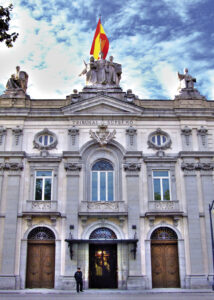Abdullah Bozkurt/Stockholm
In July Spain’s Supreme Court upheld the conviction of a Spanish-Moroccan who fought with al-Qaeda’s Syrian affiliate, Jabhat al-Nusra (now Hayat Tahrir al-Sham), in a case that again underscored Turkey’s role as a gateway for European jihadists.
Evidence presented in both the trial and appeal showed that Casiano, identified only by his first name, systematically relied on Turkey as a transit route and a platform for online jihadist propaganda as well as a jurisdiction that complicated his prosecution in Spain.
Casiano left Spain for Morocco in 2010 and by May 2014 had crossed into Syria, where he fought with Jabhat al-Nusra and its successor groups in Idlib and elsewhere until at least December 2021.
His digital footprint pointed directly to Turkey. Using the alias Candido, he created a Facebook account in June 2015 with an IP address in Istanbul, later logging in from border towns near Syria, long associated with the flow of foreign fighters and the facilitative role of Turkish intelligence service MIT.
Investigators found that Casiano relied on Turkey as a secure hub for his online propaganda while engaging in combat just across the border.
During that period he publicized some of these activities on social media, including photographs showing his involvement in warfare in Syria and in recruiting members for the terrorist organization.
Spanish Supreme Court ruling underscores Turkey’s role as a gateway for jihadist terrorists:
On several Facebook profiles he created, Casiano posted photographs of himself in military attire, carrying AK-47 Kalashnikov assault rifles and making the sign of tawhid (the oneness of God). In another image he is seen stepping on the corpses of Syrian Arab Army (SAA) members, piled up in the back of a pickup truck.
In one photo he is shown participating in combat with a Kalashnikov assault rifle, fighting under the flag of the Jayish al-Fatah coalition, which was formed by the terrorist organizations Ahrar al-Sham and Jabhat al-Nusra.
He reached out to other Spaniards to recruit them for jihadist causes. One of them, identified as Santos, who was convicted of terrorism in 2017, was told by Casiano that he was fighting in Syria. Casiano explained the differences between Jabhat al-Nusra and the Assad regime as well as between various jihadist organizations operating in Syria, aiming to persuade Santos to travel to Syria and take part in terrorist activities.
Casiano, in these conversations, always identified his organization, Jabhat Al-Nusra, with the “good” that fights against the “evil” and the organization that defends the “brothers.” In one of these conversations, a photograph of Casiano with the name “Candido” in Arabic script is included.

Casiano also made use of false identities during his stays in Turkey. Spanish police identified him as using the name Desiderio, under which he appeared in proceedings before the Hatay 3rd High Criminal Court in Antakya. In February 2022 that court reportedly ordered his provisional release, barring him from leaving Turkey, requiring him to register an address and imposing regular police check-ins.
Despite these restrictions, he managed to leave Turkey and was eventually taken into Spanish custody under a European Arrest Warrant. This is not surprising given statements by Turkish officials who openly boasted about sending jihadists to Europe. In February 2021 Turkey’s then-interior minister Süleyman Soylu revealed that the government had returned 1,126 jihadist militants to Europe over the previous five years.
During his appeal in Spain, Casiano’s defense argued that his Turkish prosecution should have barred his trial in Madrid, invoking the principle of non bis in idem, or double jeopardy. The Supreme Court rejected this claim, noting that no verifiable Turkish judgment confirming a final conviction had been produced. The ruling pointed to inconsistencies in Turkish records shared via INTERPOL and highlighted the lack of full judicial cooperation from Ankara.
The Spanish judges also noted that Casiano’s propaganda activity while in Turkey had a direct impact on Spain. Through Istanbul-based online accounts, he maintained contact with individuals in Spain, including one already convicted of terrorism offenses. These communications, in which Casiano portrayed Jabhat al-Nusra as the “defenders of the brothers,” were key to justifying Spanish jurisdiction under EU counterterrorism rules, which require prosecution of foreign fighters whose activities abroad affect domestic security.

The Supreme Court’s ruling underscores Turkey’s central role in Casiano’s trajectory: as his physical corridor into Syria, as the location where he created and managed jihadist propaganda accounts and as the country where he briefly faced judicial proceedings that failed to stop his return to Europe.
The judges also noted his use of false documents to travel through Turkey and Syria, a practice consistent with broader patterns of jihadist mobility during the conflict.
Casiano’s case illustrates how jihadist networks exploited Turkey’s porous borders, a permissive environment fostered by the Islamist government of President Recep Tayyip Erdogan and judicial ambiguities throughout the Syrian war
Thousands of Europeans followed the same route through Istanbul and southern Turkish provinces like Gaziantep, Kilis and Hatay near Syria. For Spanish investigators, Casiano’s story shows how Turkey functioned both as a gateway to the Syrian battlefield and as a haven for digital recruitment targeting audiences back in Europe.
Now serving his 10-year sentence in Spain, Casiano will also be subject to a further decade of supervised release. His conviction highlights not only the enduring threat posed by European foreign fighters but also the unresolved question of Turkey’s role as a hub in their radical journeys.












